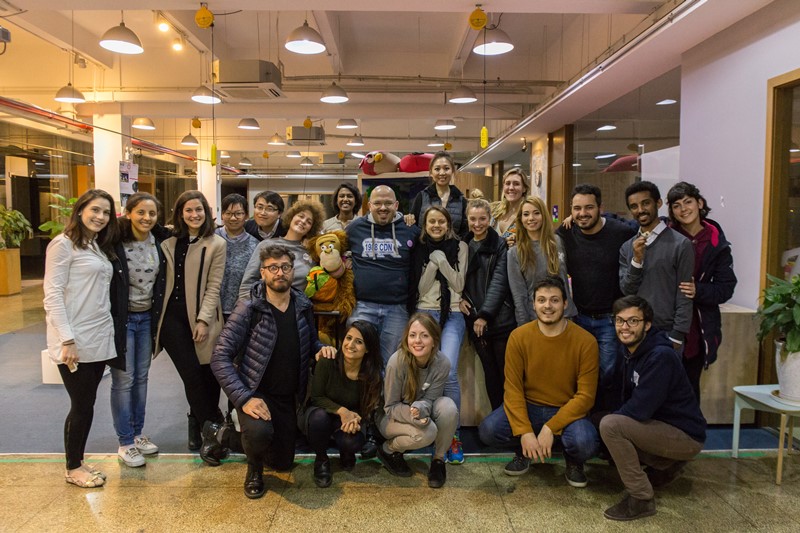
News & Events
Food Innovation is a Global Mission
By Sara Roversi, Future Food Institute
What kind of team spends 60 days traveling around the world in search of not just the best food, but also a global perspective on innovation?


Meet the delegates of the Food Innovation Global Mission (FIGM) – 14 talented students (selected from more than 80 applicants) from the Food Innovation Program (FIP) based in Reggio Emilia, Italy, who come from Brazil, China, Ethiopia, Egypt, the Philippines, Germany, Jordan, England, India, Italy, Poland, Peru, Spain, South Africa, USA, Turkey and Venezuela. Students in this second-level master’s programme come from backgrounds far and wide – engineering, food technology, chemistry, economics, design, entrepreneurship, gastronomic sciences, agronomy and management – to study about the development and diffusion of radical innovations in the food industry.
The programme is supported by the Future Food Institute (FFI) in Bologna, Italy, which has a mission to inspire a new generation of thinkers and makers working to better the world through food. The University of Modena and Reggio Emilia (UNIMORE), and the Institute for the Future (IFTF) in Palo Alto, California, are additional promoters of the FIP, which explores and identifies the critical technologies of the food chain, from production to consumption. Particular focus is dedicated to the study of the development and diffusion of industry innovations, in order to help the development of collaborative and innovative entrepreneurship.
After three months of interdisciplinary classroom experience inspired by a blend of creative learning methods, foresighted techniques and design thinking, and guided by innovation at the FIP headquarters in Reggio Emilia, the team of 14 students took off on their Global Mission – a mission not just in name, but in practice. Leaving from Bologna on 18 January, the group, as of 15 March, had been on the road for 52 days, taken 13 flights, crossed 26,000 miles in the air, visited 32 cities and interviewed over 200 people in their mission to track down Food Heroes, identify Food Icons, experience Food Rituals and find Food Innovation around the world.
The FIGM is rooted in a belief that, in order to generate innovation, lived experience, knowledge and cross-pollination are fundamental – which is why the scope of the mission is rooted in research, but expands far beyond just the academic. The aim is for the team members to eventually disperse their collected knowledge and experience from the Mission into the wider world, thus sharing a multicultural and multidimensional view of the world through food innovation. Each individual from the delegation has his or her own food research challenge that is informed by the various stops around the world and supported by academic or corporate partners.
From Italy to Amsterdam, then across the Atlantic to span the USA’s eastern and western coasts, then onto the current hubs of innovation in Asia, the Mission addresses and examines every part of the global food chain. Encounters with small-scale producers such as Yongkab Gown in the tiny town of Daejeon Musucheonha, South Korea, where strawberries, mandarins, ginseng, green beans and schisandra (which is used to prepare a traditional tea called “omija”) are cultivated, are placed in contrast with visits to the offices of global tech giants of the Silicon Valley such as Airbnb and Google, as well as the design studio IDEO. In this way, the pressing issues of today, such as food insecurity, food sustainability and food waste, can be addressed and explored in a way that transcends scale and geography.

During their stop in Singapore, the FIP students took part in a Design Thinking Workshop led by Professor Matteo Vignoli, FIP Programme Director, for the Asia Roundtable on Food Innovation for Improved Nutrition (ARoFIIN), a public-private partnership that aims to address Asia’s public health and nutrition challenges through regional, multi-stakeholder engagement and innovation.
The workshop began with a presentation by Mr Bruno Kistner, Head of the ARoFIIN Secretariat. Having shared about his experiences working around the world, Mr Kistner divided the students into four teams, and posed two challenges: 1) Ways to market fortified meals, with particular focus on fortified rice, and 2) Rethinking existing strategies and designing new business models to feed the people at the Bottom of the Pyramid (BoP).
Three teams presented three different methods for marketing fortified meals: new strategies for positioning fortified meals to final consumers; ways in which governments can make these innovations attractive for adoption by small-scale producers; and ways in which the food industry can benefit by including these innnovations in their Corporate Social Responsibility programmes.
Concerning the BoP, the last team expressed its strategy with a role-play scenario that offered an innovative economic model for rural areas and small towns in central Africa, based on social inclusion and food education, and inspired by circular economy approaches with the aim of maximising the use of resources and combatting undernutrition.
FIGM is a mission without an end. It is an exploration of place, identity and representation of culture through food; a tour that is based on learning through experience, which, in the world of food, is truly the only way to learn. Cooking, eating, thinking and doing – each stop on the trip has brought about knowledge and unexpected experiences that have been received, translated and shared through the unique lens of each individual in the delegation.
Sara Roversi is the Founder of Future Food Institute (FFI), and Executive Director of the Food Innovation Program (FIP). The FFI focuses on future scenarios of food and social innovation, while the FIP, a unique and global initiative, was established in partnership with Professor Matteo Vignoli and the University of Modena and Reggio Emilia, as well as the Institute for the Future in Palo Alto, and aims to inspire and shape a new generation of entrepreneurs and innovators in the food chain.

